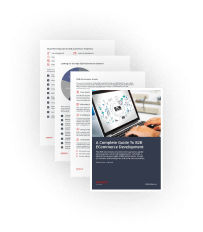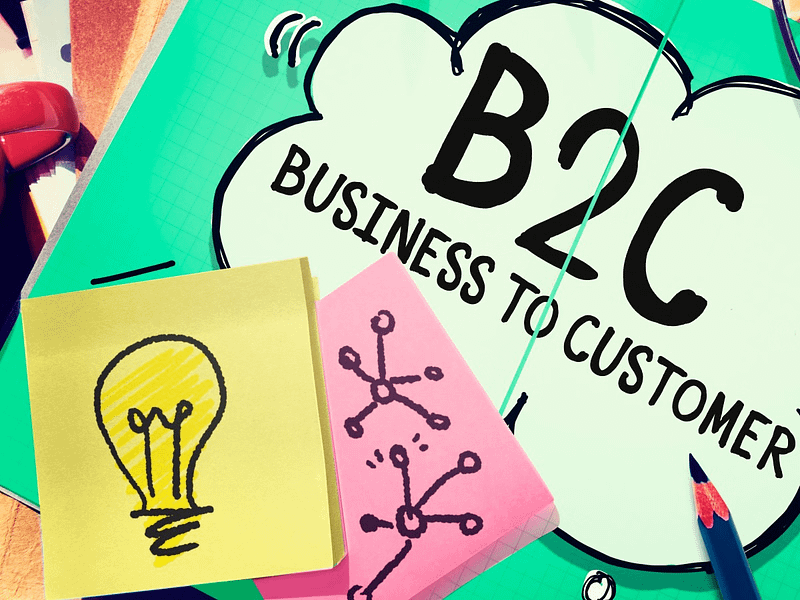So, what’s the deal with B2C? It’s basically when companies sell things directly to individuals. Most online stores work in the B2C business segment because it’s a common and easy-to-follow type of transaction.
B2C vs B2B: What is the difference?
The aim of the B2C sector is to cater to the needs of individual consumers, whereas B2B or “business to business” focuses on the requirements of businesses. B2C transactions typically involve small average purchases and lower transaction volumes, while the other segments primarily deal with larger transaction amounts and higher sales volumes.
B2C marketing targets a broad audience, encompassing residents across regions, countries, and possibly multiple countries. B2C consumers often make impulse purchases (except for significant items like cars or real estate), and the main goal of marketers is to create a wow factor for the product or service offered.
In the B2B realm, transactions are more complex. Buyers and sellers negotiate pricing, sales volumes, and delivery terms in advance. Marketing efforts concentrate on tools that validate the expertise of both the buying and selling companies.
As evident, the categorization into B2C and B2B is purposeful, as it identifies distinct client bases and necessitates different strategies for engaging with each of them.
Read more: B2B vs B2C: Leveraging Key Differences and Merging Opportunities
What is a B2C Marketplace?
To begin, it’s important to recall the concept of a marketplace. This term denotes an “eCommerce platform,” a venue for selling goods and/or services online. Diverging from an online store, a marketplace presents products not from a single seller, but from multiple sellers. These sellers, also referred to as vendors, earn profits from the sale of their goods/services, but they are subject to a commission deducted by the marketplace owner. When talking about B2C marketplace, we are referring to a platform where businesses (legal entities) engage with end consumers (individuals).
We work with clients from 170 countries, and extensive practice shows that today entrepreneurs are more interested in developing B2C marketplaces rather than online stores, because the former have a number of advantages:
- Marketplace owners do not need to produce or resell products to make a profit. The task is simplified – you need to FIND suppliers and secure cooperation with them.
- Clear distribution of responsibilities: the marketplace owner is responsible for the influx of customers, vendors are responsible for the quality of goods or services. Everyone does their jobs.
- The number of sales is higher due to the “buy into the bargain” principle. The user comes to the marketplace to buy a jacket, and in addition orders shoes and accessories.
- Online marketplaces can sell scooters, clothes and tools at the same time. If one of the directions brings losses, the marketplace will compensate for them through other sales.
Nowadays, there is a visible trend towards the development of not only multi-product, but also niche marketplaces. They don’t cover as many products and customers as the giant Amazon. They focus on a particular product category and develop gradually. For example, the Simtech Development team have launched recently a B2C marketplace from scratch for selling goods for disabled people- askned.com.au. Today there are 5 million active users, 20 thousand items in the catalog and dozens of vendors.
Kate, Project Manager at Simtech Development
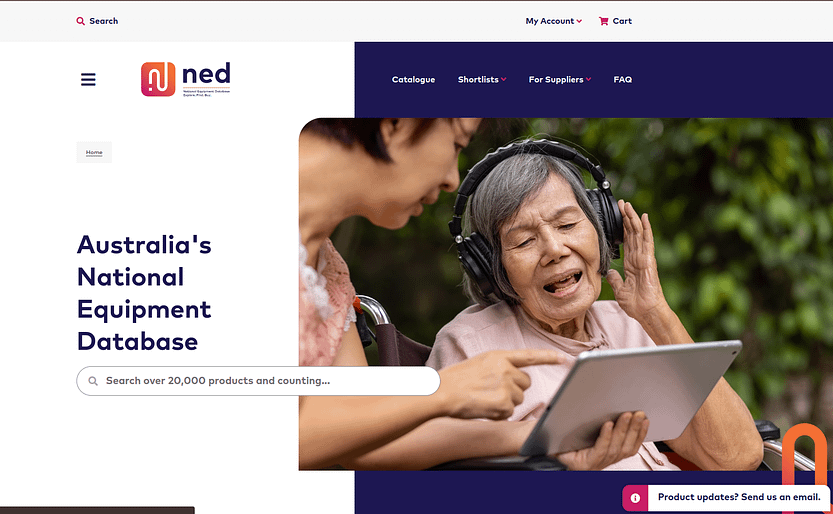
Australian B2C marketplace for disabled people, askned.com.au
Another example of a marketplace providing B2C services is the Thai dancebee.net. In 2020, our company’s developers simplified the vendor registration process and set up the store administration panel. Trainers, teachers, and coaches who are ready to share knowledge and skills act here as B2C service providers. Buyers of services are residents of Thailand who find mentors on the platform and, thanks to them, learn foreign languages, master sports, play musical instruments, and gain business experience.
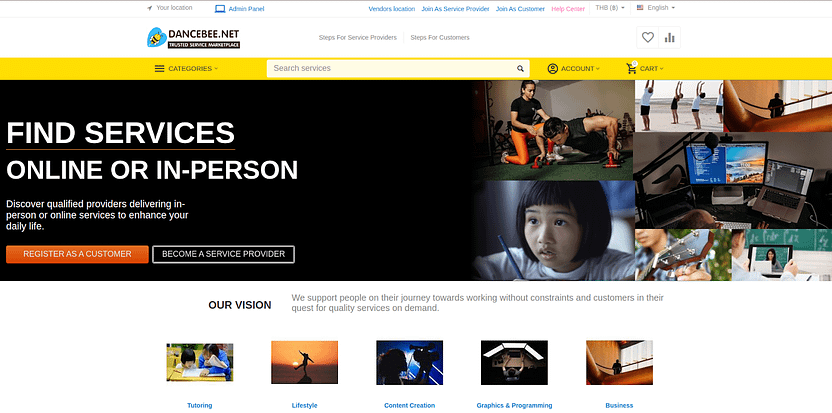
Thai B2C service marketplace dancebee.net
Advantages and disadvantages of B2C marketplaces for business owners
Pros
- For traditional businesses transitioning to digital sales, B2C online marketplaces provide an opportunity for business expansion. Starting an online business can be more cost-effective than a traditional one, as it eliminates the need to pay for physical premises, utilities, and equipment.
- Eliminating the need to produce or resell goods/services independently, instead focusing on establishing partnerships with suppliers and earning profits through sales commissions.
- No geographical restrictions on expanding the customer base.
- A wide array of products available on the B2C marketplace platform, leading to increased average user spending. Access to detailed sales, customer, and business performance analytics.
- A variety of technical tools for store promotion, including solutions to enhance user experience and interactive elements.
Cons
- Competition with large eCommerce platforms and other marketplace providers, especially if the latter decide to create separate stores and attract customers from the online hypermarket.
- Quality control and regulation of supplier operations, including the quality and packaging of goods, and timely delivery to warehouses or directly to customers.
- Establishing partnerships with logistics and transport companies, warehouse owners, and their staff (storage and delivery of goods is the business owner’s responsibility, not the vendors’).
- Analysis of advertising and marketing campaigns, gathering analytics, and identifying the most effective customer acquisition channels.
- Ensuring uninterrupted marketplace operation, including protection from cyberattacks and maintaining high page loading speed, especially during periods of high visitor traffic, such as during sales events like Black Friday.
Advantages and disadvantages of B2C marketplaces for suppliers
Pros:
- Vendors are relieved from creating and managing their own online stores and the associated staff.
- Sales can be launched quickly, often within a few days, with the right approach. Expanding the consumer audience is the responsibility of the marketplace owner.
Cons:
- Potential high competition if there are similar or identical products from other sellers.
- Limited communication with customers, as interaction is typically conducted through marketplace managers.
- Weak brand positioning, as buyers often perceive the purchase as from the online marketplace rather than the individual seller.
- Compliance with the listing requirements and rules, including specific content and product page completion.
- The delay in receiving sales revenue can result in potential cash flow shortages.
- Only officially registered entrepreneurs (individual entrepreneurs, LLCs, or self-employed individuals) can sell on marketplaces.
B2C eCommerce worldwide
Consumers are increasingly shifting to online shopping, a trend that was accelerated by the pandemic and has now become an established habit. Online shopping aligns with the modern trend of efficient resource allocation, saving time, energy, and money. It has liberated customers from the constraints of physical shopping, leading to the growing popularity of online retail.
China leads the global B2C eCommerce market, accounting for more than a half of global online retail sales in 2021. The United States and UK follow.
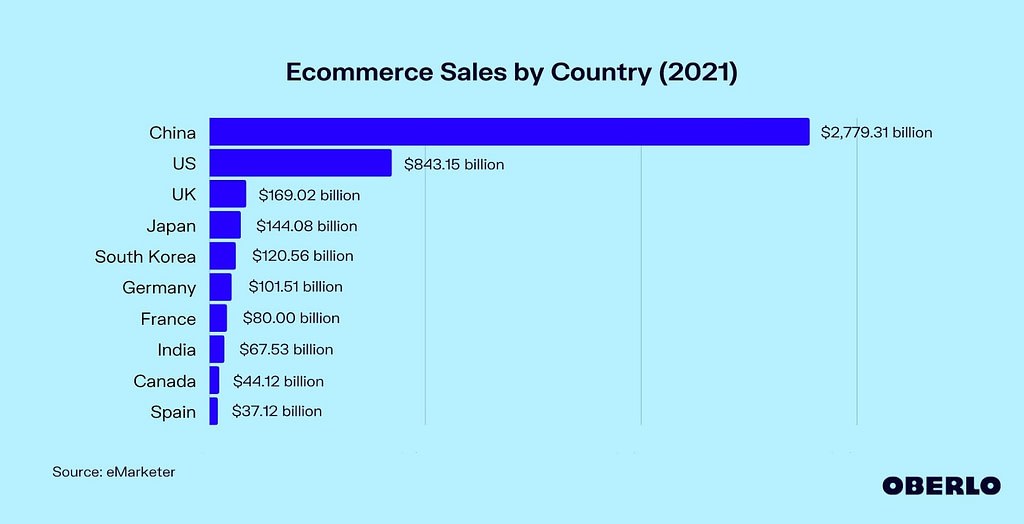
Share of online retail sales in countries around the world, 2021
Best B2C Marketplace Examples
Here are examples of the world’s most successful B2C marketplace companies.
AliExpress

Amazon

Booking.com

ASOS
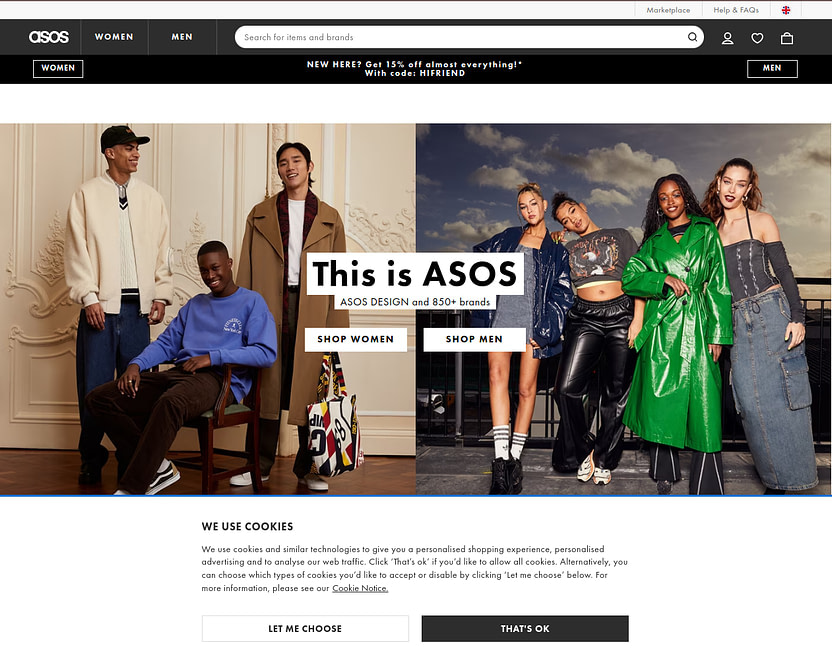
Houzz

What products and services do B2C companies offer?
The top 5 categories of popular products on marketplaces are as follows:
- Electronics and household appliances – 22%
- Furniture and household goods – 18.3%
- Clothing and shoes – 14.5%
- Food products – 13.2%
- Beauty and health products – 7.7%
The remaining 25% encompasses products related to tourism, hunting and fishing, hobbies and interests, medicines and dietary supplements, auto products, jewelry, costume jewelry, accessories, videos, games, consoles, and antiques. In essence, a wide variety of items can be marketed and sold on B2C platforms. Our company has experience collaborating with the Unixmo.co.nz marketplace in the Dominican Republic. This platform not only offers household goods and clothing but also car parts in its product range!
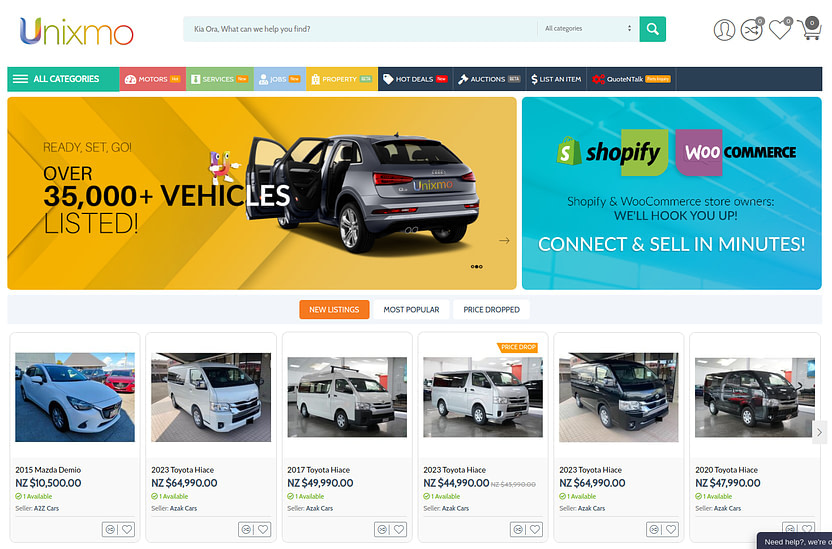
Dominican B2C marketplace Unixmo.co.nz
In 2021, the Simtech Development team created the B2C marketplace ChopLocal.com from scratch for an American farmer from Iowa, Jared Aiken (USA).
B2C marketplace for meat gastronomy ChopLocal.com, developed by the Simtech Development team
Jared brought together farmers and end consumers on his trading platform, who were able to buy fresh and prepared meat, as well as sausages and seafood online
Launching a B2C Marketplace: Key Stages
You can expedite the development of a B2C marketplace within a timeframe of 2 to 6 months, but it’s crucial to account for the preparatory phase and the marketplace’s post-launch promotion. The stages of this process can be outlined as follows.
B2C marketplace launch stages:
- Gathering analytics and setting apart from competitors
- Defining requirements for a B2C marketplace
- Selecting an IT service provider
- Launching MVP
- Attracting vendors and promoting
- Analytics and marketplace development
Gathering Information and Setting Apart from Competitors
Suppose you’re contemplating the launch of a B2C marketplace. The success of your endeavor hinges on the uniqueness of your product or service. To achieve this, it is essential to establish a unique selling proposition (USP). Detail your target audience, their behaviors, and preferences. Conduct an analysis of your competitors, their most successful projects, and popular products (scrutinize their websites, social media platforms, and blogs). Negative customer feedback holds particular value, as it provides insights into areas where you can excel.
Defining Requirements for a B2C Marketplace
Prepare a specification outlining the functional and business requirements for the online store. This task may not always be straightforward for those without professional expertise. To address this, Simtech Development offers the “Online Store Architecture Design” service.
Read more: Functional and Business Requirements for an eCommerce Site
Our specialists will assist in crafting a comprehensive document, serving as a foundation for developers to create a B2C marketplace in complete alignment with the client’s expectations.
Selecting an IT Service Provider
Creating a marketplace requires a team of skilled professionals. If you intend to attract investors, the selected IT contractor will be their primary focus, as the contractor is tasked with ensuring the success of the development and instilling confidence. We will provide guidance on how to avoid errors when choosing a contractor.
MVP Launch
To ensure the profitability of a project, it is essential to commence with the launch of a Minimal Viable Product (MVP). This allows for testing a business hypothesis, evaluating a product, and gathering user feedback. Moreover, an MVP significantly reduces the project’s budget (its development comprises 10-40% of the cost of a fully-fledged product).
Read more: What is MVP: Launching a eCommerce MVP with a Minimum of Costs
Vendor Attraction and Promotion
Diverse information channels, such as social networks, forums, and offline events involving potential partners (e.g., exhibitions or conferences), should be utilized to attract suppliers. Information should be presented in a simple and clear manner (utilize presentations, provide examples, offer instructions, and consider creating a video review of the marketplace). Equipping vendors with professional mobile business cards that link directly to their marketplace profiles can facilitate networking at industry events and drive qualified traffic to specific vendor storefronts.
You can provide suppliers with a grace period to operate on the site (typically 1-3 months, entailing reduced commission or free advertising promotion). Initially, you can also assist vendors in completing profiles, enabling them to swiftly adapt to the online store’s requirements and feel your support and interest.
Marketing and Advertising for a B2C Marketplace
Effective marketing and advertising are imperative for a B2C eCommerce marketplace, as customer attraction is a primary concern for online business owners. Contextual advertising, SEO tools, and organic search promotion can be instrumental in this regard.
Read more: eCommerce SEO Trends for 2024
Marketplace Analytics and Development
The B2C sphere evolves rapidly, influencing changes in purchasing behavior. To meet new demands, ongoing development of the marketplace is necessary. Analytics, customer reviews, and specific metrics will aid the online store owner in this endeavor.
Trends of B2C Marketplaces Development
- Research service Business Insider Intelligence claims that eCommerce retail sales worldwide will grow by 8.9% in 2023 and by 50% by 2025, amounting to about $7.3 trillion.
- According to Nasdaq, by 2040, up to 95% of all purchases will be made online.
- The number of niche marketplaces will gradually grow.
- ECommerce is heading towards personalization through “smart” search and selection of products based on the user’s profile.
- Consumer expectations for online shopping will change. There is increasing interest in environmentally friendly and reusable products.
- Also, buyers increasingly want to see not only products on websites, but also elements of entertainment, so virtual reality tools will be in demand.
Read more: What Would Be eCommerce Trends in 2024?
Conclusion
The growth of eCommerce is rapid, with retail sales on B2C marketplaces taking the lead. Entrepreneurs are no longer satisfied with being vendors on major marketplaces such as Amazon or Etsy.
Launching a marketplace is a crucial step in business expansion, necessitating thorough analysis, the development of a unique selling proposition (USP), and the creation of a high-quality IT product. B2C eCommerce development is a complex task that requires the expertise of professional specialists. If you are seeking a responsible and dependable IT service provider, reach out to Simtech Development. We will assist you in quick and cost-efficient launching of online sales for your business.
